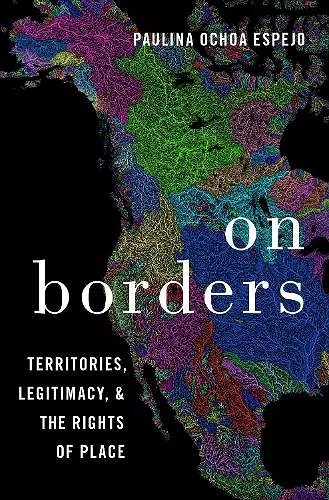On Borders
Territories, Legitimacy, and the Rights of Place
Format:Paperback
Publisher:Oxford University Press Inc
Published:8th Sep '20
Currently unavailable, and unfortunately no date known when it will be back
This paperback is available in another edition too:
- Hardback£97.00(9780190074197)

When are borders justified? Who has a right to control them? Where should they be drawn? Today people think of borders as an island's shores. Just as beaches delimit a castaway's realm, so borders define the edges of a territory, occupied by a unified people, to whom the land legitimately belongs. Hence a territory is legitimate only if it belongs to a people unified by a civic identity. Sadly, this Desert Island Model of territorial politics forces us to choose. If we want territories, then we can either have democratic legitimacy, or inclusion of different civic identities--but not both. The resulting politics creates mass xenophobia, migrant-bashing, hoarding of natural resources, and border walls. To escape all this, On Borders presents an alternative model. Drawing on an intellectual tradition concerned with how land and climate shape institutions, it argues that we should not see territories as pieces of property owned by identity groups. Instead, we should see them as watersheds: as interconnected systems where institutions, people, the biota, and the land together create overlapping civic duties and relations, what the book calls place-specific duties. This Watershed Model argues that borders are justified when they allow us to fulfill those duties; that border-control rights spring from internationally-agreed conventions--not from internal legitimacy; that borders should be governed cooperatively by the neighboring states and the states system; and that border redrawing should be done with environmental conservation in mind. The book explores how this model undoes the exclusionary politics of desert islands.
Paulina Ochoa Espejo's On Borders: Territories, Legitimacy, & the Rights of Place offers an indirect response and critique of the limitations of cosmopolitan frameworks as they relate to place-based politics via an analysis of borders and bordered thinking. * Arturo Chang, Theory & Event *
Even for those who still believe that traditional territorial borders are very real because they matter in multiple ways, the book certainly comes recommended. * Dorte Jagetic Andersen, Journal of Borderlands Studies *
Richly textured and deeply insightful ... Ochoa Espejo's book is a splendid read, and in my view should be required reading for scholars of borders from all disciplines. * Patti Tamara Lenard, The Review of Politics *
Explores borders, territories, and inclusion in terms of place, examining the practices and physical structures that constitute the localized, concrete character of people's experiences. * Journal of Economic Literature (Volume 59, no. 1) *
Banging on about 'broken borders' is the major leitmotif of contemporary populism in Europe and the United States. This subtle and engaging exploration of borders as a theme in political philosophy shows how much about them is obscured when questions of immigration policy and territorial sovereignty are bundled together with the 'border question.' In placing borders at the center of analysis, this book effectively demolishes and replaces the very basis to the current debate about their meaning * John Agnew, University of California, Los Angeles *
Ochoa Espejo urges us to think place apart from presumed national identities in border politics. Foregrounding the politics of peoples and the earth, and backgrounding nation states, she expands the intellectual space for conceiving, drawing, and governing the proximate territories of borders. * Wendy Brown, University of California, Berkeley *
Ochoa Espejo argues that we should recognize borders as sites of important place-specific rights and duties. Looking at borders from this perspective, rather than through the lens of questions about collective identities or individual rights, disrupts conventional normative discussions. Her focus on place has a challenging and transformative effect on debates about territory and immigration and enables us to see ethical issues, especially environmental issues, that otherwise largely escape our view. A rich and rewarding read * Joseph H. Carens, University of Toronto *
On Borders is itself a watershed in the political theory of territory, of migration, and of the interactions between human institutions and the natural world. Paulina Ochoa Espejo reframes our picture of the state and its relationship to its members and the places they live and work. Her originality is grounded in both deep insight as well as extensive and careful research across several disciplines. It is political theory for the 21st century. * Avery Kolers, University of Louisville *
ISBN: 9780190074203
Dimensions: 231mm x 155mm x 23mm
Weight: 544g
344 pages